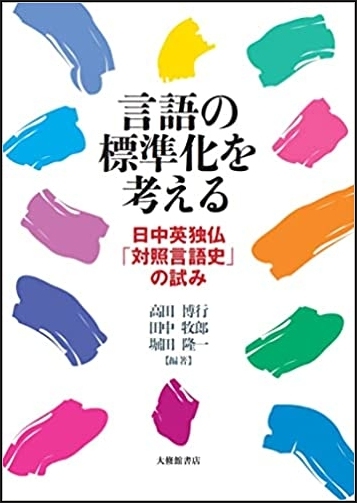2024-01-11 Thu
■ #5372. 「標準語」は近代ヨーロッパの発明品である [standardisation][sociolinguistics][prestige][history_of_linguistics][vernacular][renaissance][romanticism][gengo_no_hyojunka]
昨日の記事「#5371. 言語学史のハンドブックの目次」 ([2024-01-10-1]) で紹介した The Oxford Handbook of the History of Linguistics の第15章 "Vernaculars and the Idea of a Standard Language" を開いてみた.私の研究テーマの1つに(主に近代における)英語の標準化 (standardisation) があり,本ブログでも様々に論じてきたが,言語の標準化や標準語について,こちらのハンドブックではどのような扱いがなされているかを確かめたかった.
冒頭の1段落だけですでにおもしろい.「標準語」という概念は近代ヨーロッパの発明品であり,現代ヨーロッパでは常に注目され続けてきた論題であるという.
The greatest and most important phenomenon of the evolution of language in historic times has been the springing up of the great national common languages---Greek, French, English, German, etc.---the 'standard' languages.
So wrote Otto Jespersen . . . , and the idea of a standard language has undoubtedly been one of the most seductive in the history of European linguistic thought. It has resulted in some of the most heated of debates on language matters, drawing in both academic and non-academic actors, and ranging from the learned Questione della Lingua in Italy around the turn of the sixteenth century . . . to nineteenth-century debates on how best to standardise a newly independent Norwegian . . . , to the ongoing and often passionate discussions in homes and in bars throughout the modern world about 'right' and 'wrong' usage. The notion of a standard language has underpinned language teaching and learning since the Middle Ages, based as language teaching is on the acceptance that there is a right form of a language and a wrong form. The belief in a standard has motivated much of the grammar and dictionary writing, and has also been a central ideology in the emergence and reinforcement of the modern European nations. In the period following the Renaissance, national pride was expressed through the notion that the European vernaculars were as rich and as ordered as the Classical languages. Under the influence of Romanticism this idea of the richness of the 'national common languages' was increasingly linked to a sense of there being some sort of natural relationship between a people and their language, and indeed the perceived link between language and nation, for better or for worse, remains a strong one . . . . (359--60)
英語史における近代の標準化については「#4093. 標準英語の始まりはルネサンス期」 ([2020-07-11-1]) を参照.諸言語の標準化については,私も編著者として関与した『言語の標準化を考える --- 日中英独仏「対照言語史」の試み』(大修館,2022年)を手に取っていただければ (本書についての関連記事は gengo_no_hyojunka より) .

・ Linn, Andrew. "Vernaculars and the Idea of a Standard Language." Chapter 15 of The Oxford Handbook of the History of Linguistics. Ed. Keith Allan. Oxford: OUP, 2013. 359--74.
・ 高田 博行・田中 牧郎・堀田 隆一(編著)『言語の標準化を考える 日中英独仏「対照言語史」の試み』 大修館,2022年.
2018-03-04 Sun
■ #3233. 英語自由化と英語相対化の19世紀 [standardisation][romanticism][history_of_linguistics][prescriptivism][historiography][wordsworth][coleridge]
「#3231. 標準語に軸足をおいた Blake の英語史時代区分」 ([2018-03-02-1]) の記事で取りあげた,Blake による英語史区分の第6期(1798年?1914年)について考える.ロマン主義の起こりと第1次世界大戦に挟まれたこの時期は,標準英語を念頭においた英語史の観点からは,諸変種や方言的多様性が意識された時代といえる.19世紀が近づくと,18世紀の特徴だった堅苦しい規範主義の縛りからある程度解放されるようになり,自然にして自発的な言葉遣いが尊重され,非標準変種が見直される契機が生じた.英語自由化・英語相対化の思想が発現したといってよいだろう.新時代の到来を告げる狼煙が,象徴的に,Wordsworth and Coleridge による Lyrical Ballads (1798) の出版だった.Blake (13) 曰く,
This collection of poetry [= the Lyrical Ballads] attacked the idea of a prescriptive language for poetry and raised the concept that it should deal with 'the real language of men'. It was inspired in part by the French Revolution of 1789, which had called into question the very bases of the old order and its assumptions of regulation and conformity. This attitude gradually spilled over into language as well, for there seemed to be a profound attack on the nature of authority and the assumption that those at the top could dictate what was right and acceptable to the rest of society. While such attitudes did not change overnight, we can accept that there was a new spirit abroad which provides us with a convenient boundary in 1798.
この1798年に始まり,第1次世界大戦の勃発した1914年までの時期は,長い19世紀と表現してもよいだろう.Blake によれば,この時代は,言語的にみて (1) 多様性と非標準変種の尊重,(2) 歴史的研究の興隆,という2点に特徴づけられる時代だという.それぞれの部分を引用しよう.
Firstly, the previous age had been concerned with regulating language and discovering the principles which underlined a language on the assumption that all languages followed the same structure. The nineteenth century was interested in the diversity of languages and varieties of language. The growth of the empire promoted interest in a whole range of languages other than the classical languages which had hitherto been the model for all linguistic structure. And scholars in England began to record the various regional dialects found in the United Kingdom. Whereas before these dialects may have been considered provincial and little more than barbarous, their use in poetry and the novel and the collections and studies based on these forms gradually meant that they were seen as real means of communication, even if they were not as socially acceptable as the standard. The respect for non-standard varieties increased, though this was a gradual process which even today has not made these dialects socially acceptable. One problem that such varieties faced, and still face, is that they do not usually exist in a regulated written form and thus may be regarded as inferior.
Secondly, the nineteenth century saw an enormous growth in the historical study of language. Many of the changes in English and its ancestors which will be outlined in the book were discovered in the nineteenth century. The development of the concept of a family tree for languages and the recognition that English was a Germanic language which belonged to the Proto-Indo-European family of languages (also known simply as Indo-European) were among the advances made at this time. Not unnaturally this put English and the classical languages into a different perspective. Their nature was not different from that of other languages, and English dialects could be regarded as closely related to standard English in origin and development; they had simply not been chosen to form the standard.
一言でいえば,標準英語を,そして英語そのものを,相対化して捉える視点が生み出された時期といえるだろう.ただし,それによって絶対的な視点が崩れたわけではなく,あくまで相対的な視点も並び立つようになったということである.絶対的な視点は,21世紀の今でも十分に生きているのだ.
・ Blake, N. F. A History of the English Language. Basingstoke: Macmillan, 1996.
2018-03-02 Fri
■ #3231. 標準語に軸足をおいた Blake の英語史時代区分 [standardisation][periodisation][historiography][chancery_standard][prescriptive_grammar][prescriptivism][romanticism]
Blake の英語史書は,英語の標準化 (standardisation) と標準英語の形成という問題に焦点を合わせた優れた英語史概説である.とりわけ注目すべきは,従来のものとは大きく異なる英語史の時代区分法 (periodisation) である.英語史の研究史において,これまでも様々な時代区分が提案されてきたが,Blake のそれは一貫して標準語に軸足をおく社会言語学的な観点からの提案であり,目が覚めるような新鮮さがある (Blake, Chapter 1) .7期に分けている.以下に,コメントともに記そう.
(1) アルフレッド大王以前の時代 (?9世紀後半):標準的な変種が存在せず,様々な変種が並立していた時代
(2) 9世紀後半?1250年:ウェストサクソン方言の書き言葉標準が影響力をもった時代
(3) 1250年?1400年:標準語という概念がない時代;標準語のある時代に挟まれた "the Interregnum"
(4) 1400年?1660年:標準語の書き言葉(とりわけ綴字と語彙のレベルにおいて)が確立していく時代
(5) 1660年?1798年:標準語の統制の時代
(6) 1798年?1914年:諸変種や方言的多様性が意識された時代
(7) 1914年?:英語の分裂と不確かさに特徴づけられる時代
(1) アルフレッド大王以前の時代 (?9世紀後半) は,英語が英語として1つの単位として見られていたというよりも,英語の諸変種が肩を並べる集合体と見られていた時代である.したがって,1つの標準語という発想は存在しない.
(2) アルフレッド大王の時代以降,とりわけ10--11世紀にかけてウェストサクソン方言が古英語の書き言葉の標準語としての地位を得た.1066年のノルマン征服は確かに英語の社会的地位をおとしめたが,ウェストサクソン標準語は英語世界の片隅で細々と生き続け,1250年頃まで影響力を残した.少なくとも,それを模して英語を書こうとする書き手たちは存在していた.英語史上,初めて標準語が成立した時代として重要である.
(3) 初めての標準語が影響力を失い,次なる標準語が現われるまでの空位期間 (the Interregnum) .諸変種が林立し,1つの標準語がない時代.
(4) 英語史上2度目の書き言葉の標準語が現われ,定着していく時代.15世紀前半の Chancery Standard が母体(の一部)であると考えられる.しかし,いまだ制定や統制という発想は稀薄である.
(5) いわゆる規範主義の時代.辞書や文法書が多く著わされ,標準語の統制が目指された時代.区切り年代は,王政復古 (Restoration) の1660年と,ロマン主義の先駆けとなる Wordsworth and Coleridge による Lyrical Ballads が出版された1798年.いずれも象徴的な年代ではあるが,確かに間に挟まれた時代は「統制」「抑制」「束縛」といったキーワードが似合う時代である.
(6) Lyrical Ballads から第1次世界大戦 (1914) までの時代.前代の縛りつけからある程度自由になり,諸変種への関心が高まり,標準語を相対化して見るようになった時代.一方,前代からの規範主義がいまだ幅を利かせていたのも事実.
(7) 第1次世界大戦から現在までの時代.英語が世界化しながら分裂し,先行き不透明な状況,"fragmentation and uncertainty" (Blake 15) に特徴づけられる時代.
伝統的な「古英語」「中英語」「近代英語」の区分をさらりと乗り越えていく視点が心地よい.
・ Blake, N. F. A History of the English Language. Basingstoke: Macmillan, 1996.
Powered by WinChalow1.0rc4 based on chalow